Israeli media say Iran arming Iraqi militias for possible conflict
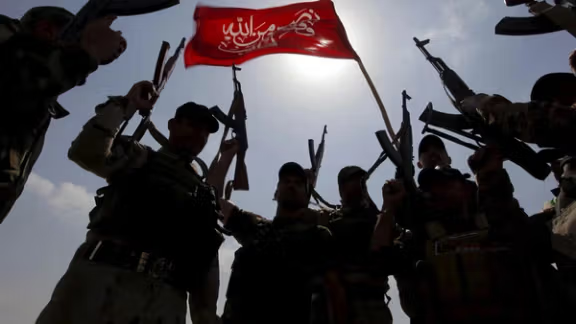
Iran is supplying Shi’ite militias in Iraq with more advanced weapons in preparation for a possible new round of fighting with Israel, Israeli media reported on Tuesday.

Iran is supplying Shi’ite militias in Iraq with more advanced weapons in preparation for a possible new round of fighting with Israel, Israeli media reported on Tuesday.
Citing Iraqi sources familiar with the matter, Israel’s public broadcaster Kan Reshet Bet said Tehran had stepped up arms transfers to allied groups in Iraq following losses suffered by Iran-backed factions in Lebanon, Syria and Gaza.
The report said Iran appeared to be shifting the focus of its regional military influence toward Iraqi militias.
The station said the Islamic Revolutionary Guard Corps’ Quds Force was training fighters for potential coordinated ground and air operations, while the groups themselves feared strikes from Israel and the United States.
The sources said the militias take orders from Tehran more than from Iraq’s Prime Minister Mohammed Shia al-Sudani, who has sought to keep his country out of regional escalation.
Reports in Israeli outlets including Walla and The Jerusalem Post last week said the Israel Defense Forces and intelligence agencies were preparing for possible attacks by Iranian-aligned groups in Iraq.
The Post said Tehran was investing resources to strengthen these militias and establish what it called “terror infrastructure” capable of striking Israel when ordered.
Iranian Quds Force commander Esmail Ghaani visited Iraq late in October for talks with senior militia leaders.
Al-Sudani said earlier this year that his government had blocked dozens of attempted attacks by Iran-backed groups during the 12-day conflict between Iran and Israel in June.
In an interview with the Associated Press, he said Baghdad must carefully balance relations with both Washington and Tehran.
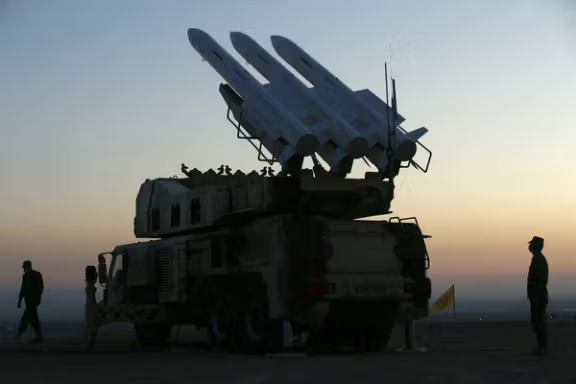
Iran’s armed forces said on Tuesday that any public remarks about the country’s military or defense cooperation with other nations are invalid unless confirmed by its headquarters, state media reported.
In a statement carried by state television, the General Staff of the Armed Forces said comments by “uninformed or unauthorized individuals” had appeared in recent days and stressed that only official statements from its communications center represent Iran’s position. It urged media outlets to avoid reporting on such issues without coordination.
The warning came after parliament member Amirhossein Sabeti said there had been no disagreement between Iran and its key partners, Russia and China, over weapons deliveries. Sabeti said all weapons or systems that Iran requested and paid for had been delivered.
“There is no weapon we asked for from China or Russia that they did not give us,” he said earlier this week. “On the fourth day of the war, we received several air defense systems from China.”
He added that any delays in receiving equipment were due to domestic factors, not foreign unwillingness. “If there was any delay in delivery, it was from our side, not theirs,” Sabeti said, adding that Russia and China “had no ill intent” and that Iran should make better use of what he described as shared strategic interests.
The statement came amid escalating divisions in Tehran over the country’s reliance on Moscow and Beijing.
Former president Hassan Rouhani and ex-foreign minister Mohammad Javad Zarif have questioned what they call Iran’s overreliance on Moscow, prompting sharp criticism from hardliners.
Parliament Speaker Mohammad Bagher Ghalibaf accused the two of “damaging national interests” after a video surfaced showing Rouhani noting that both Russia and China had supported UN sanctions on Iran in 2010.
Zarif separately clashed with Russian Foreign Minister Sergei Lavrov, accusing Moscow of trying to block the 2015 nuclear deal and of keeping Iran “in a state of controlled isolation.”
Several lawmakers echoed Ghalibaf’s remarks, accusing the former officials of undermining Iran’s strategic partnerships.
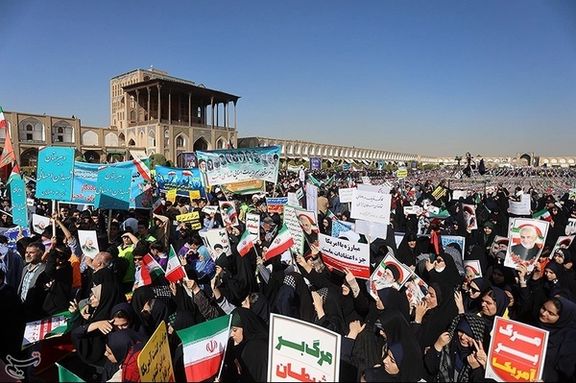
Iran on Tuesday marked the anniversary of the 1979 seizure of the US embassy in Tehran with state-organized rallies across the country, the first such commemorations since the United States and Israel carried out air strikes on Iranian targets earlier this year.
Crowds gathered across the country waving national flags and portraits of Iran’s leaders to observe what officials call the National Day of Fighting Global Arrogance.
The annual event, organized by state institutions, commemorates the November 4, 1979 takeover of the US embassy by militant students who held 52 Americans hostage for 444 days, leading to the rupture of diplomatic ties between Tehran and Washington.
Marchers, including students, public employees and members of the military, chanted slogans against the United States and Israel in Tehran and major cities.
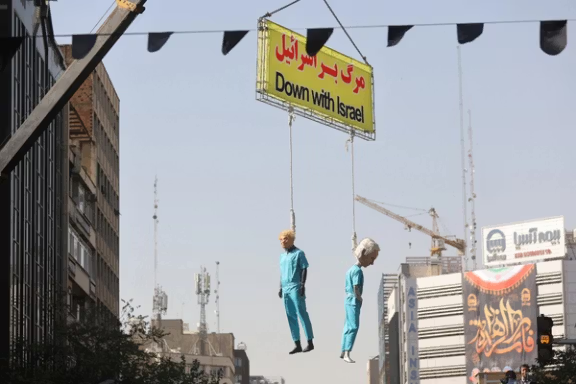
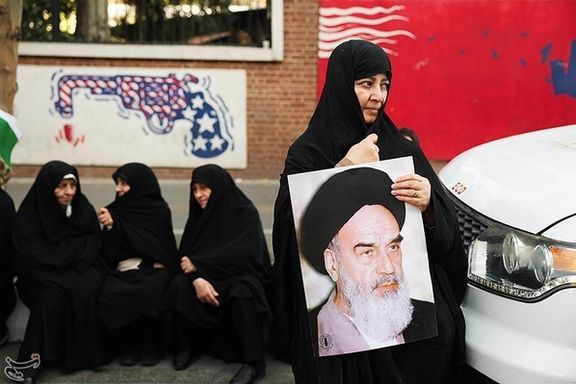
State television showed large gatherings in Tehran, Mashhad, Isfahan and Shiraz, describing the turnout as a show of national unity and defiance following the recent confrontation.
In Tehran, organizers also showcased models of Iran’s ballistic missiles and nuclear centrifuges, which state media said symbolized the country’s technological progress and deterrent capability.
In the capital, demonstrators moved from Palestine Square to the site of the former US embassy, where the ceremony concluded with speeches, patriotic songs and the reading of a closing resolution denouncing Western sanctions and reaffirming support for Palestinians.
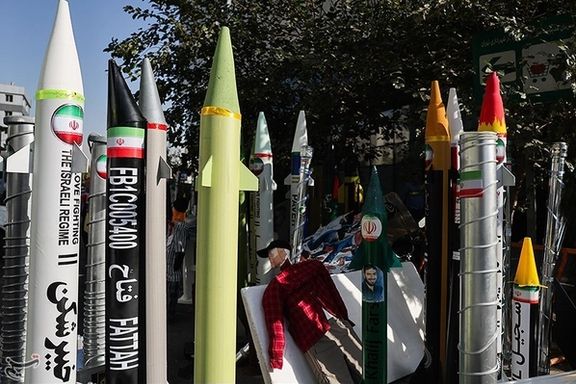
Officials stress independence and unity
Parliament Speaker Mohammad-Bagher Ghalibaf, who joined the rally and delivered the main speech, said the anniversary symbolized Iran’s resolve to remain independent and resist what he called domination by foreign powers.
He said the country’s independence could not be “traded for any concession” and that “Death to America” was a rejection of hegemony, not hostility toward a nation.
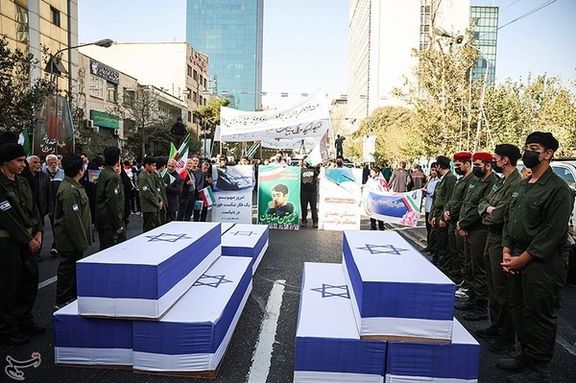
Ghalibaf cited the 1953 coup against Prime Minister Mohammad Mossadegh and the 1964 exile of Ayatollah Ruhollah Khomeini as examples of past interference, arguing that Iran’s self-reliance in defense, science and technology was its safeguard against renewed pressure.
Former Revolutionary Guards commander Mohsen Rezaei told reporters that Iran’s message to adversaries was one of “resistance and readiness,” saying the nation would respond firmly to any renewed threat.
Resolution reaffirms resistance policy
At the close of the Tehran rally, a statement read aloud by organizers reaffirmed Iran’s commitment to what it called “rational resistance” against Western powers and support for Palestinians in Gaza.
The text rejected any compromise with the United States or Israel, urging national cohesion and stronger economic management at home.
The declaration also stressed that Iran’s defense and nuclear program were integral to national sovereignty and called on government institutions to curb inflation and address public grievances.
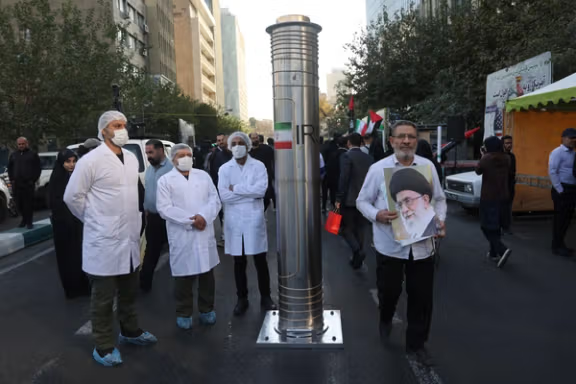
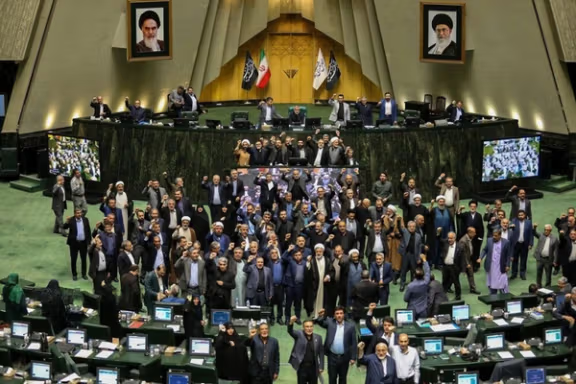
Iranian lawmakers chanted “Death to America” and “Death to Israel” in parliament on Tuesday as they marked the anniversary of the 1979 seizure of the US Embassy in Tehran, state media reported.
Deputy speaker Ali Nikzad, who presided over the session, said Iran would not yield to foreign pressure. “The hostility and plots of the criminal America against the Iranian nation did not begin on November 4 and will not be solved through negotiations with the United States,” he said. “This conflict is rooted in principles, and the main issue is the effort to make the Iranian nation surrender.”
Nikzad said the takeover of the US Embassy was not a rash or emotional act but a reaction to years of US interference. He said the United States did not tolerate an independent power in West Asia and that disputes such as the nuclear issue were “only excuses.”
After his remarks, lawmakers shouted anti-US and anti-Israel slogans, according to state television.
Khamenei defends anti-US slogan
The chants came a day after Supreme Leader Ali Khamenei defended the slogan and reaffirmed Iran’s anti-US stance in a speech to students in Tehran. Khamenei said that Iran’s dispute with Washington was “essential, not tactical,” rejecting the notion that the chant itself created enmity between the two countries.
“The slogan ‘Death to America’ is not what causes hostility — the enmity is rooted in the nature of America’s imperialist system,” he said.
Khamenei added that the United States would have to end its military presence in the Middle East and withdraw support for Israel before any future cooperation with Iran could even be considered.
Israeli Prime Minister Benjamin Netanyahu, in an interview last month, cited such chants as proof that Iran remains a global threat. He said Tehran is developing intercontinental ballistic missiles that could reach American cities and warned that “you don’t want to be under the nuclear gun of these people who chant ‘death to America.’”
The anniversary marks the start of the Iran Hostage Crisis, when followers of Ruhollah Khomeini stormed the US Embassy in Tehran on November 4, 1979, and held 52 American diplomats and staff hostage for 444 days, an episode that triggered more than four decades of confrontation between Tehran and Washington.
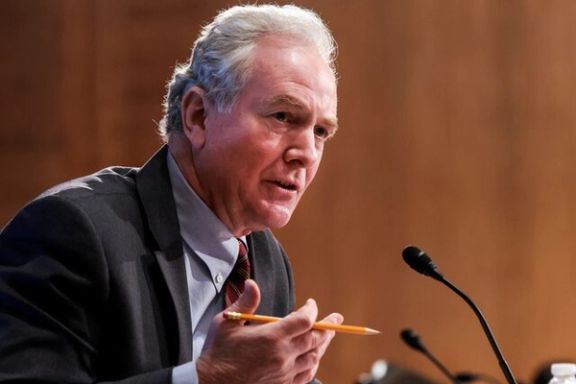
US Senator Chris Van Hollen urged Iran to engage in nuclear negotiations, saying it must resolve the issue diplomatically as President Trump signals openness to talks to resolve the lingering impasse.
“President Trump has said he wants to sit down and negotiate this with Iran," the Democratic senator told Iran International.
"Iran having a nuclear weapon is unacceptable, so it's important that they be willing to resolve this,” the Maryland lawmaker added.
He was speaking before a defiant speech by Iran’s Supreme Leader on Monday in which the veteran theocrat appeared to double down on a hard line toward Washington.
Khamenei, 86, ruled out any cooperation with the United States, saying every US president had demanded “Iran’s surrender” but failed.
“Only if the United States completely cuts its backing for the Zionist regime, removes its military bases from the region, and ceases interfering in its affairs, their request for cooperation with Iran—not in the near future but much later—could be examined,” Khamenei said.
Iran denies seeking nuclear arms and says its program is peaceful.
The United States held five rounds of negotiations with Tehran over its disputed nuclear program earlier this year, for which President Donald Trump set a 60-day ultimatum.
When no agreement was reached by the 61st day on June 13, Israel launched a surprise military offensive, followed by US strikes on June 22 targeting key nuclear facilities in Isfahan, Natanz and Fordow.
Senator Van Hollen has previously expressed skepticism of military efforts to deny Iran a nuclear bomb.
“I have long supported the goal of ensuring that Iran never obtains a nuclear weapon. But bombing is not, in my view, the best and certainly not the most sustainable way of achieving that goal,” he told the Arms Control Association in a speech in September.
Van Hollen has said the window of diplomacy is still open in his remarks in September and there should be a coordinated effort to reach an agreement.
“The United States, the E3 (France, Germany, and Britain) and Iran should move swiftly to restart negotiations on a pragmatic, effective nuclear agreement,” he said.
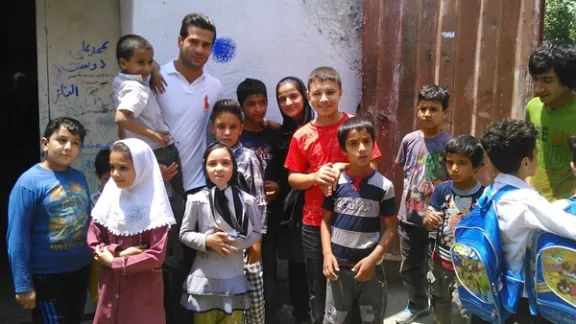
A US-based rights group condemned Tehran for shutting down one of its oldest child welfare organizations and detaining its founder, calling it an assault on civil society as Iran faces worsening child labor and poverty.
Iran's security forces arrested child rights defender Hossein Mirbahari, a founding member of the Society for the Protection of Child Laborers and Street Children, at his sister’s home in Tehran on October 15.
New-York based Center for Human Rights in Iran (CHRI) said on Monday Mirbahari has been held without charge and denied access to his family and lawyer, with his whereabouts still unknown.
“Mirbahari’s unlawful arrest and the closing of the organization mirror the Islamic Republic’s dismantling of other NGOs, and reflect its intensifying drive to wipe out independent civil society organizations,” CHRI’s executive director Hadi Ghaemi said in a statement.
He added that the government’s actions showcase what he called the Islamic Republic's "lawless thuggery", accusing it of fearing “any independent societal activities, no matter how vital a role they play.”
Security forces sealed the organization’s office in Tehran the same day as Mirbahari’s arrest and confiscated equipment and communication devices, effectively halting its operations.
The NGO's closure and Mirbahari's arrest were first reported by the Iranian outlet Emtedad in mid-October.
The group had been operating legally since 2002 after receiving official registration from the Interior Ministry, providing education, health services, and psychological support to vulnerable children.
CHRI called on the United Nations, UNICEF, and the European Union to press Iran for Mirbahari’s immediate release and to demand the reopening of the organization, citing his fragile health following chemotherapy.
The closure comes amid what CHRI described as an escalating campaign by Iranian authorities to criminalize humanitarian work and silence advocates for children, women, and marginalized communities.
The group said the shutdown has already disrupted schooling for many children the NGO supported.
Iran faces a worsening child labor crisis, with estimates ranging from 1.5 to 7 million working children. Official figures cited by Iran’s Parliamentary Research Center in 2023 said 15% of the country’s children are engaged in labor, while Tehran’s City Council estimated 70,000 child laborers in the capital alone.
The Society for the Protection of Child Laborers and Street Children had served as a rare legal platform for advocacy and assistance to working and street children across Iran, employing specialized units in education, health, social work, and research before its forced closure.
The closure marks a continuation of previous crackdowns on independent civil society organizations.
Past Iranian NGO closures
Last April, Iran shut down the Mehr-e Shams-Afarid NGO safe house, which provided support and empowerment programs for vulnerable women.
In August 2022, Iran shut down the Noor Sepid Hedayat Social Harm Reduction Institute, an NGO that supported women with substance abuse issues and vulnerable children in Shoush, a neighborhood in southern Tehran.
Iranian authorities shut down Khaneh Khorshid, an NGO aiding women with substance abuse in southern Tehran, in March 2022.
In 2020, Iranian security forces arrested Sharmin Meymandinejad, the founder and director of the largest anti-poverty NGO in the country, Imam Ali's Popular Student Relief Society (IAPSRS), and subsequently closed down its headquarters.
In August 2019, another independent charity supporting marginalized women and girls in Tehran, Omid-e-Mehr was forcibly closed by the Iranian authorities.